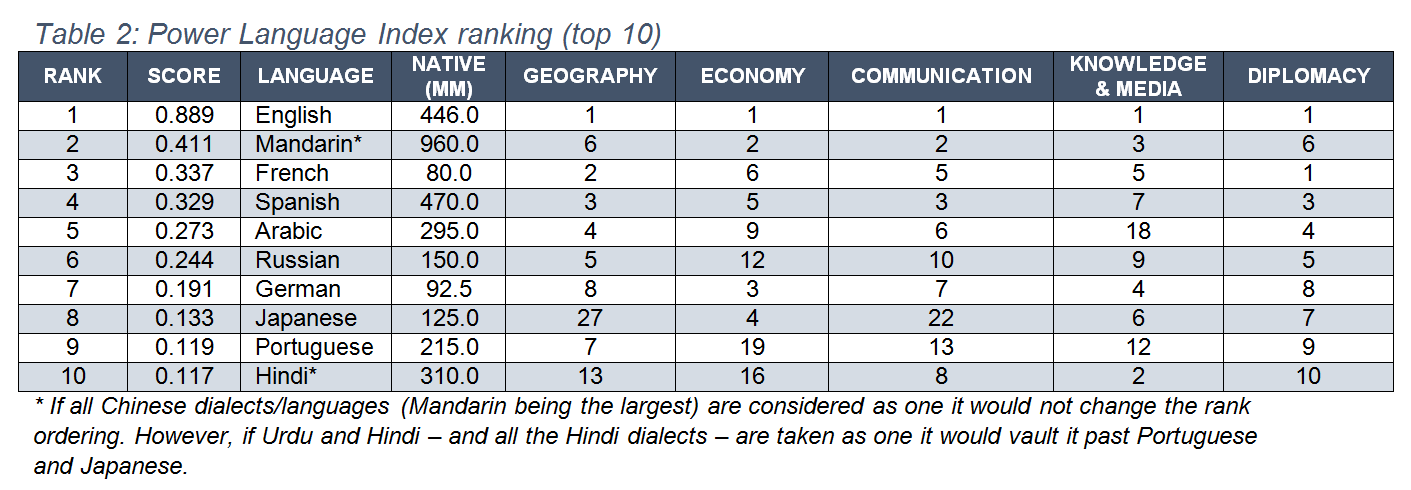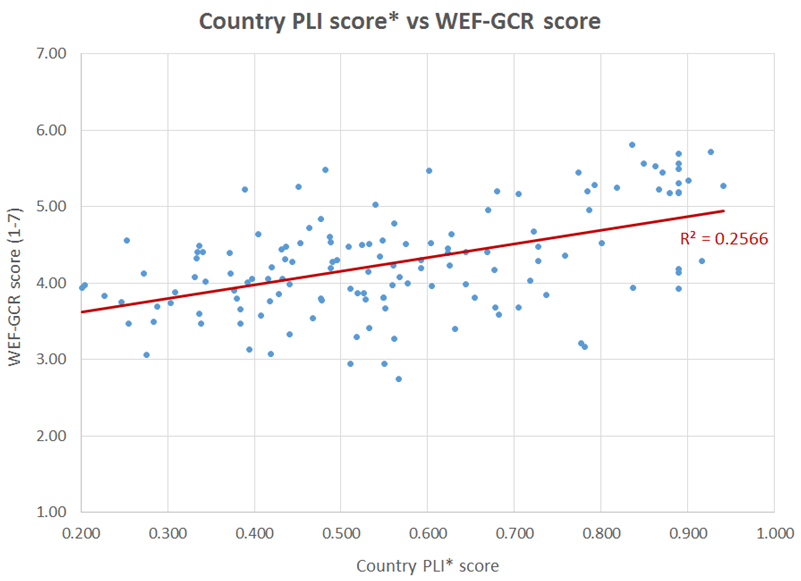These are the most powerful languages in the world

Image: REUTERS/Alkis Konstantinidis

Get involved with our crowdsourced digital platform to deliver impact at scale
Stay up to date:
Arts and Culture
There are over 6,000 languages spoken in the world today, but some 2,000 of them count fewer than 1,000 speakers. Moreover, just 15 account for half of the languages spoken in the world.
In a globalized world with multilingual societies, knowledge of languages is paramount in facilitating communication and in allowing people to participate in society’s cultural, economic and social activities. A pertinent question to ask then is: which are the most useful languages? If an alien were to land on Earth, which language would enable it to most fully engage with humans?
To understand the efficacy of language (and by extension culture), consider the doors (“opportunities”) opened by it. Broadly speaking, there are five opportunities provided by language:
1. Geography: The ability to travel
2. Economy: The ability to participate in an economy
3. Communication: The ability to engage in dialogue
4. Knowledge and media: The ability to consume knowledge and media
5. Diplomacy: The ability to engage in international relations
Based on the opportunities above an index can be constructed to compare/rank languages on their efficacy in the various domains. The Power Language Index (PLI) uses 20 indicators to measure the influence on language (see Table 1). The index measures the usefulness of a language to a representative human being and is not meant to apply to any particular person with their own set of conditions, preferences and geography. Neither is the index a measure of the beauty/merit of a language or its associated culture(s).

A challenge in this exercise is that most often the data are linked with nation states, rather than the languages themselves. Moreover, multiple languages may be associated with a given country, and the different usages and statuses of languages may be complex. For example, a language may have official status in a country even if few people speak it. Other challenges include differentiating between a language and a dialect. Thus a coherent and robust way of mapping national indicators to the various languages associated with a country is required (if you’re interested in finding out how that’s done, watch this).
Table 2 lists the 10 most powerful languages according to the PLI. English is by far the most powerful language. It is the dominant language of three G7 nations (USA, UK and Canada), and British legacy has given it a global footprint. It is the world’s lingua franca. Mandarin, which ranks second, is only half as potent. French comes in at third, thanks to its prestige standing in international diplomacy. Rounding out the top five are Spanish and Arabic.
The top six languages – even if the diplomacy opportunity is ignored – also happen to be the official languages of the United Nations. The remaining four in the top 10 include the two other BRIC languages (Portuguese and Hindi), and the tongues of two economic heavyweights (Germany and Japan).

Language is an essential component of competitiveness and the results above explain (in part) why London and New York are the world’s two premier cities. Likewise, Hong Kong and Singapore, with their English infrastructure, rather than monolingual Tokyo, are Asia’s financial capitals. Indeed, it is no coincidence that eight of the 10 global financial centres are English-speaking/proficient cities.
The strength of English has both positive and negative effects. Its status helps facilitate international communication in a globalized world. But conversely, “Englishisation” – the creep of English into other languages and its displacement of rivals – threatens the survival of lesser languages and the integrity of others. France, for instance, has taken steps to block the encroachment of English into French.
The figure below shows the relationship between language (PLI score) and competiveness, as measured by the Forum’s Global Competitiveness Index. Four of the 10 most competitive economies have English as an official language. The remaining six have high shares of English speakers and/or a high proficiency in English, with the exception of Japan.

* Country PLI scores are calculated as weighted averages of the PLI scores according to the share of the population who speak its prevailing tongues. The country score is also adjusted by the share of the population who speak English.
Language proficiency can also (partially) explain the composition of the global elite. Namely, the movers and shakers of the world tend to have an English-speaking bias. That is, countries with low English proficiency count fewer members of the global elite than expected relative to population, GDP or number of billionaires. Thus global policy debates, which invariably are done in English, may neglect the concerns of English-weak nations.
Globalization made English a global phenomenon. But could technology (i.e. real-time translation devices) obviate the need to learn languages and equalize the linguistic field? Translation technologies will indeed be a breakthrough, much the way that GPS maps have obviated road atlases.

However, language is much more than just a collection of words. It is intertwined with culture and is an emotional aspect of human character.
Moreover, studies have shown that multilinguals solve problems more critically. Likewise, personality has been shown to change according to the language in which a person functions. In short, translation devices will never fully replace the human voice and the benefits of learning languages. Just as Google has not made all humans researchers, neither will translation devices, per se, make us more empathetic or knowledgeable of other cultures.
Although English is now the dominant language, might Mandarin (or another language) one day challenge its supremacy? This leads to an interesting question: which languages will be the most powerful in 2050? Table 3 is a forecast of the PLI based on the expected values of the 20 indicators that will prevail in 2050.

Is it perhaps time to dig out those old Rosetta Stone tapes and get to learning another language?
Don't miss any update on this topic
Create a free account and access your personalized content collection with our latest publications and analyses.
License and Republishing
World Economic Forum articles may be republished in accordance with the Creative Commons Attribution-NonCommercial-NoDerivatives 4.0 International Public License, and in accordance with our Terms of Use.
The views expressed in this article are those of the author alone and not the World Economic Forum.
The Agenda Weekly
A weekly update of the most important issues driving the global agenda
You can unsubscribe at any time using the link in our emails. For more details, review our privacy policy.
More on Arts and CultureSee all
Joseph Fowler and Amilcar Vargas
April 18, 2024
Robin Pomeroy and Sophia Akram
April 8, 2024
Faisal Kazim
April 3, 2024
Robin Pomeroy and Linda Lacina
March 28, 2024






